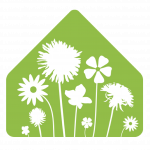
“Good Neighbor Iowa aims to reduce unnecessary urban pesticide use and to transform lawn culture to encourage appreciation of diverse lawns as a way to protect child health, water quality, pets, pollinators, and biodiversity.”
Good Neighbor Iowa is a statewide public health education initiative managed in partnership with the University of Northern Iowa’s Center for Energy and Environmental Education (CEEE). The CEEE at UNI strives to empower Iowans with the knowledge, experiences, tools, and inspiration to create a sustainable, desirable future. Our efforts extend across the state of Iowa by the work of CEEE staff, UNI student fellows, and local champions within their communities.
Good Neighbor Iowa uplifts pesticide-free lawn management practices, encourages appreciation for diverse lawns, and educates the public on alternative methods of lawn management. We partner with residents and community leaders across Iowa to pledge to be “Good Neighbors”, joining a collective of people across Iowa that choose to manage their lawns without pesticides for the health of children and the environment.
Good Neighbor Iowa wants to protect Iowa’s children, pets, water quality, pollinators, and biodiversity from the harmful effects of urban pesticide use. Science-driven evidence has shown that pesticides pose threats to environmental and human health.
Good Neighbor Iowa was planned, designed, and developed by students of the University of Northern Iowa’s Interactive Digital Studies Practicum in the Spring of 2017, in collaboration with the UNI Conservation Corps. The UNI Conservation Corps (discontinued since 2018) was an initiative led by the CEEE that consisted of teams of students and faculty working with community leaders to research, analyze, plan, design and implement science-driven knowledge in the context of community environmental conservation in Iowa. The goals of the UNI Conservation Corps were to elevate the role of science and its public value in the educational experience of UNI students, and to cultivate and support a culture of acting on what we already know through science.
The program has since been transitioned to be managed by CEEE staff.